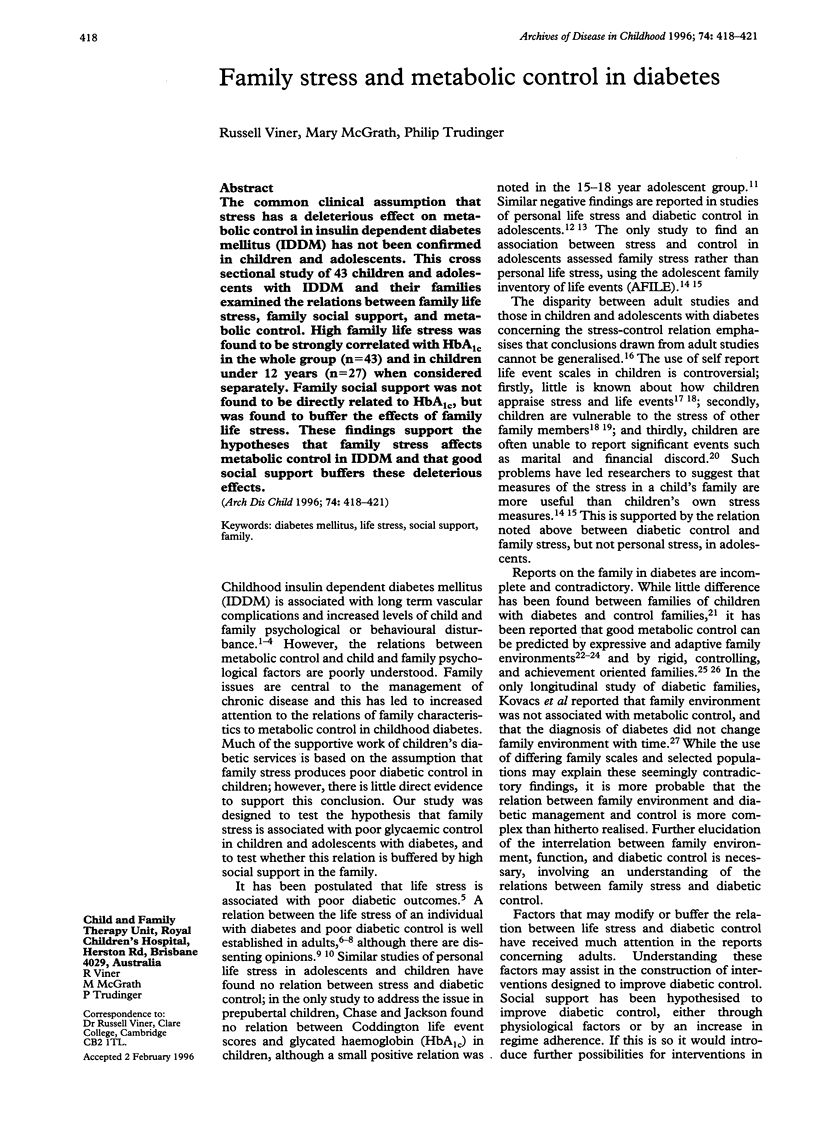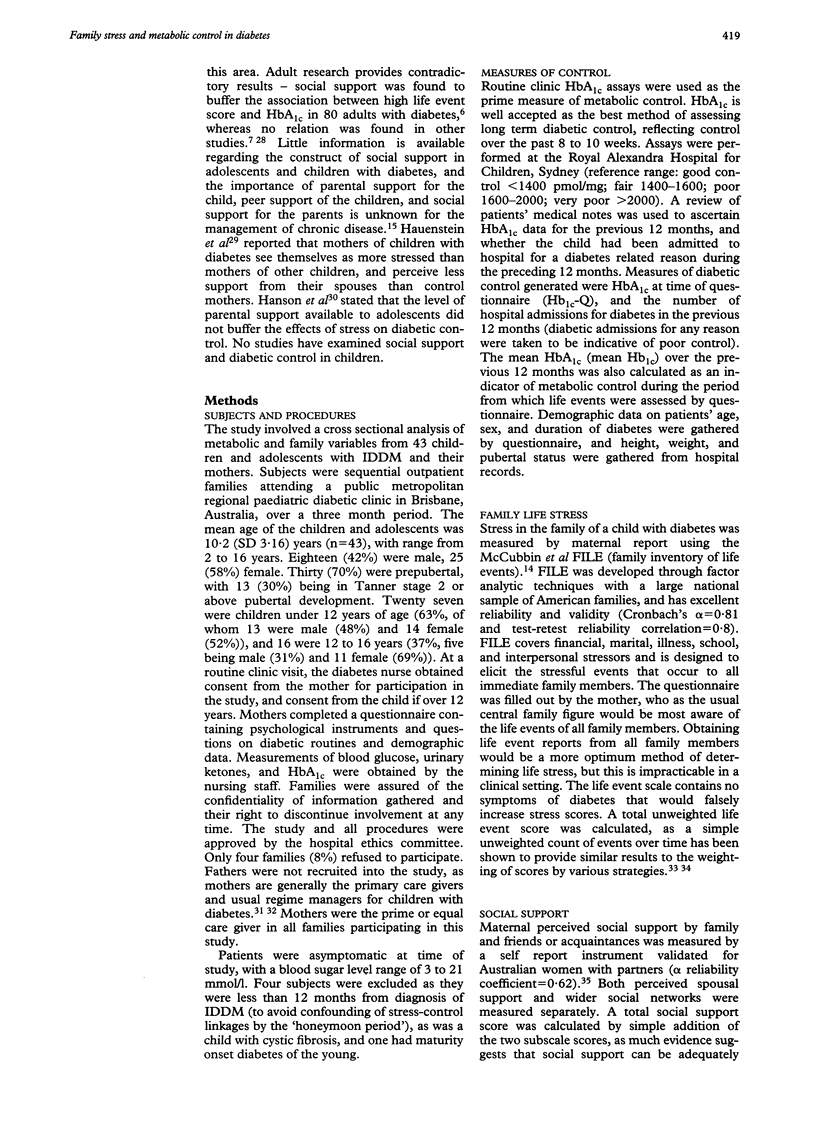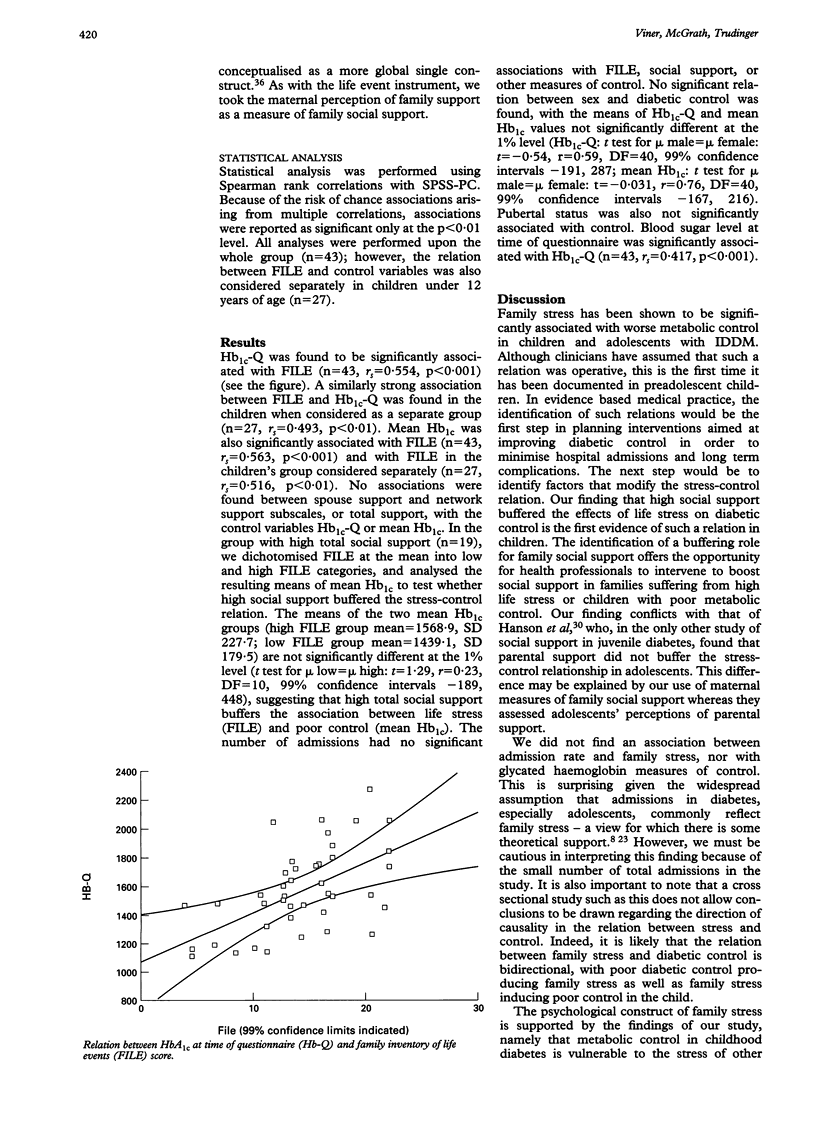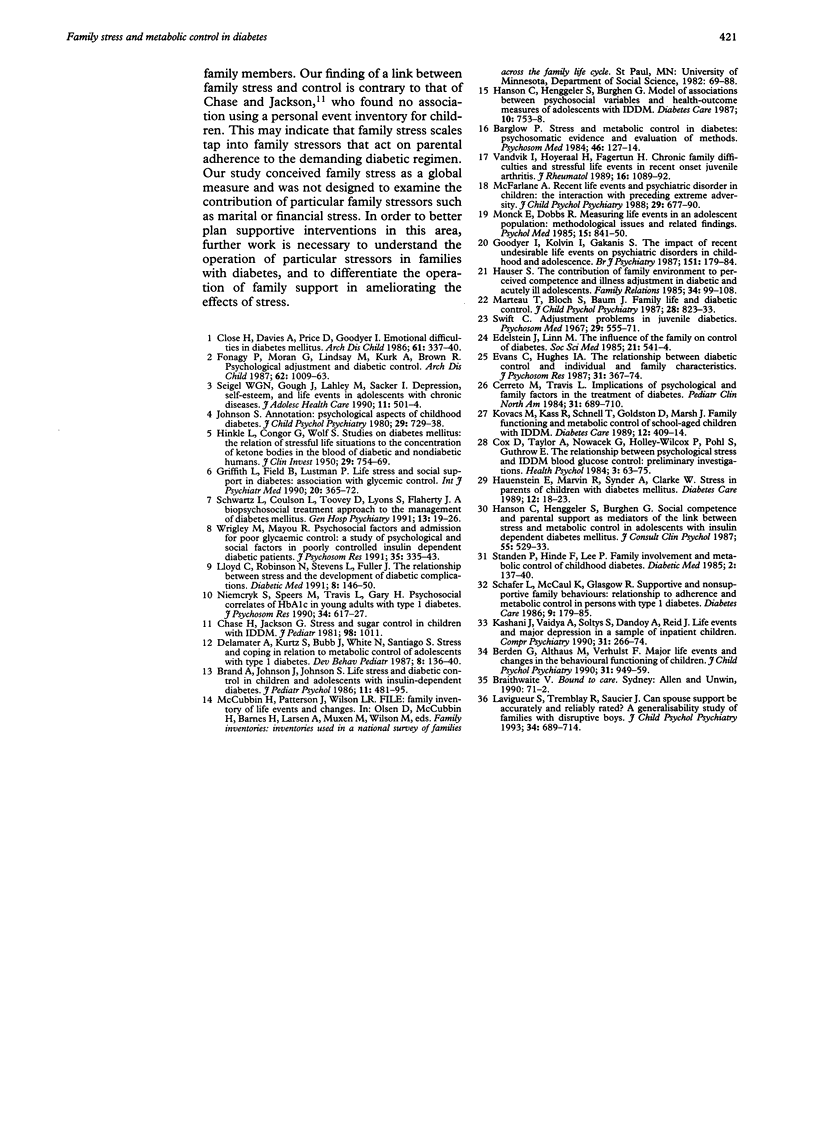Abstract
The common clinical assumption that stress has a deleterious effect on metabolic control in insulin dependent diabetes mellitus (IDDM) has not been confirmed in children and adolescents. This cross sectional study of 43 children and adolescents with IDDM and their families examined the relations between family life stress, family social support, and metabolic control. High family life stress was found to be strongly correlated with HbA1c in the whole group (n = 43) and in children under 12 years (n = 27) when considered separately. Family social support was not found to be directly related to HbA1c, but was found to buffer the effects of family life stress. These findings support the hypotheses that family stress affects metabolic control in IDDM and that good social support buffers these deleterious effects.
Full text
PDF



Selected References
These references are in PubMed. This may not be the complete list of references from this article.
- Barglow P., Hatcher R., Edidin D. V., Sloan-Rossiter D. Stress and metabolic control in diabetes: psychosomatic evidence and evaluation of methods. Psychosom Med. 1984 Mar-Apr;46(2):127–144. doi: 10.1097/00006842-198403000-00005. [DOI] [PubMed] [Google Scholar]
- Berden G. F., Althaus M., Verhulst F. C. Major life events and changes in the behavioural functioning of children. J Child Psychol Psychiatry. 1990 Sep;31(6):949–959. doi: 10.1111/j.1469-7610.1990.tb00836.x. [DOI] [PubMed] [Google Scholar]
- Brand A. H., Johnson J. H., Johnson S. B. Life stress and diabetic control in children and adolescents with insulin-dependent diabetes. J Pediatr Psychol. 1986 Dec;11(4):481–495. doi: 10.1093/jpepsy/11.4.481. [DOI] [PubMed] [Google Scholar]
- Cerreto M. C., Travis L. B. Implications of psychological and family factors in the treatment of diabetes. Pediatr Clin North Am. 1984 Jun;31(3):689–710. doi: 10.1016/s0031-3955(16)34603-x. [DOI] [PubMed] [Google Scholar]
- Close H., Davies A. G., Price D. A., Goodyer I. M. Emotional difficulties in diabetes mellitus. Arch Dis Child. 1986 Apr;61(4):337–340. doi: 10.1136/adc.61.4.337. [DOI] [PMC free article] [PubMed] [Google Scholar]
- Cox D. J., Taylor A. G., Nowacek G., Holley-Wilcox P., Pohl S. L., Guthrow E. The relationship between psychological stress and insulin-dependent diabetic blood glucose control: preliminary investigations. Health Psychol. 1984;3(1):63–75. doi: 10.1037//0278-6133.3.1.63. [DOI] [PubMed] [Google Scholar]
- Edelstein J., Linn M. W. The influence of the family on control of diabetes. Soc Sci Med. 1985;21(5):541–544. doi: 10.1016/0277-9536(85)90038-3. [DOI] [PubMed] [Google Scholar]
- Evans C. L., Hughes I. A. The relationship between diabetic control and individual and family characteristics. J Psychosom Res. 1987;31(3):367–374. doi: 10.1016/0022-3999(87)90057-2. [DOI] [PubMed] [Google Scholar]
- Fonagy P., Moran G. S., Lindsay M. K., Kurtz A. B., Brown R. Psychological adjustment and diabetic control. Arch Dis Child. 1987 Oct;62(10):1009–1013. doi: 10.1136/adc.62.10.1009. [DOI] [PMC free article] [PubMed] [Google Scholar]
- Goodyer I. M., Kolvin I., Gatzanis S. The impact of recent undesirable life events on psychiatric disorders in childhood and adolescence. Br J Psychiatry. 1987 Aug;151:179–184. doi: 10.1192/bjp.151.2.179. [DOI] [PubMed] [Google Scholar]
- Griffith L. S., Field B. J., Lustman P. J. Life stress and social support in diabetes: association with glycemic control. Int J Psychiatry Med. 1990;20(4):365–372. doi: 10.2190/APH4-YMBG-NVRL-VLWD. [DOI] [PubMed] [Google Scholar]
- HINKLE L. E., Jr, CONGER G. B., WOLF S. Studies of diabetes mellitus: the relation of stressful life situations to the concentration of ketone bodies in the blood of diabetic and non-diabetic humans. J Clin Invest. 1950 Jun;29(6):754–769. doi: 10.1172/JCI102313. [DOI] [PMC free article] [PubMed] [Google Scholar]
- Hanson C. L., Henggeler S. W., Burghen G. A. Social competence and parental support as mediators of the link between stress and metabolic control in adolescents with insulin-dependent diabetes mellitus. J Consult Clin Psychol. 1987 Aug;55(4):529–533. doi: 10.1037/0022-006X.55.4.529. [DOI] [PubMed] [Google Scholar]
- Hauenstein E. J., Marvin R. S., Snyder A. L., Clarke W. L. Stress in parents of children with diabetes mellitus. Diabetes Care. 1989 Jan;12(1):18–23. doi: 10.2337/diacare.12.1.18. [DOI] [PubMed] [Google Scholar]
- Johnson S. B. Psychological aspects of childhood diabetes. J Child Psychol Psychiatry. 1988 Nov;29(6):729–738. doi: 10.1111/j.1469-7610.1988.tb00749.x. [DOI] [PubMed] [Google Scholar]
- Kashani J. H., Vaidya A. F., Soltys S. M., Dandoy A. C., Reid J. C. Life events and major depression in a sample of inpatient children. Compr Psychiatry. 1990 May-Jun;31(3):266–274. doi: 10.1016/0010-440x(90)90011-g. [DOI] [PubMed] [Google Scholar]
- Kovacs M., Kass R. E., Schnell T. M., Goldston D., Marsh J. Family functioning and metabolic control of school-aged children with IDDM. Diabetes Care. 1989 Jun;12(6):409–414. doi: 10.2337/diacare.12.6.409. [DOI] [PubMed] [Google Scholar]
- Lavigueur S., Tremblay R. E., Saucier J. F. Can spouse support be accurately and reliably rated? A generalizability study of families with disruptive boys. J Child Psychol Psychiatry. 1993 Jul;34(5):689–714. doi: 10.1111/j.1469-7610.1993.tb01065.x. [DOI] [PubMed] [Google Scholar]
- Lloyd C. E., Robinson N., Stevens L. K., Fuller J. H. The relationship between stress and the development of diabetic complications. Diabet Med. 1991 Feb-Mar;8(2):146–150. doi: 10.1111/j.1464-5491.1991.tb01561.x. [DOI] [PubMed] [Google Scholar]
- Marteau T. M., Bloch S., Baum J. D. Family life and diabetic control. J Child Psychol Psychiatry. 1987 Nov;28(6):823–833. doi: 10.1111/j.1469-7610.1987.tb00671.x. [DOI] [PubMed] [Google Scholar]
- McFarlane A. C. Recent life events and psychiatric disorder in children: the interaction with preceding extreme adversity. J Child Psychol Psychiatry. 1988 Sep;29(5):677–690. doi: 10.1111/j.1469-7610.1988.tb01888.x. [DOI] [PubMed] [Google Scholar]
- Monck E., Dobbs R. Measuring life events in an adolescent population: methodological issues and related findings. Psychol Med. 1985 Nov;15(4):841–850. doi: 10.1017/s0033291700005079. [DOI] [PubMed] [Google Scholar]
- Niemcryk S. J., Speers M. A., Travis L. B., Gary H. E. Psychosocial correlates of hemoglobin Alc in young adults with type I diabetes. J Psychosom Res. 1990;34(6):617–627. doi: 10.1016/0022-3999(90)90105-d. [DOI] [PubMed] [Google Scholar]
- Schafer L. C., McCaul K. D., Glasgow R. E. Supportive and nonsupportive family behaviors: relationships to adherence and metabolic control in persons with type I diabetes. Diabetes Care. 1986 Mar-Apr;9(2):179–185. doi: 10.2337/diacare.9.2.179. [DOI] [PubMed] [Google Scholar]
- Seigel W. M., Golden N. H., Gough J. W., Lashley M. S., Sacker I. M. Depression, self-esteem, and life events in adolescents with chronic diseases. J Adolesc Health Care. 1990 Nov;11(6):501–504. doi: 10.1016/0197-0070(90)90110-n. [DOI] [PubMed] [Google Scholar]
- Standen P. J., Hinde F. R., Lee P. J. Family involvement and metabolic control of childhood diabetes. Diabet Med. 1985 Mar;2(2):137–140. doi: 10.1111/j.1464-5491.1985.tb00618.x. [DOI] [PubMed] [Google Scholar]
- Swift C. R., Seidman F., Stein H. Adjustment problems in juvenile diabetes. Psychosom Med. 1967 Nov-Dec;29(6):555–571. doi: 10.1097/00006842-196711000-00001. [DOI] [PubMed] [Google Scholar]
- Wrigley M., Mayou R. Psychosocial factors and admission for poor glycaemic control: a study of psychological and social factors in poorly controlled insulin dependent diabetic patients. J Psychosom Res. 1991;35(2-3):335–343. doi: 10.1016/0022-3999(91)90088-6. [DOI] [PubMed] [Google Scholar]


